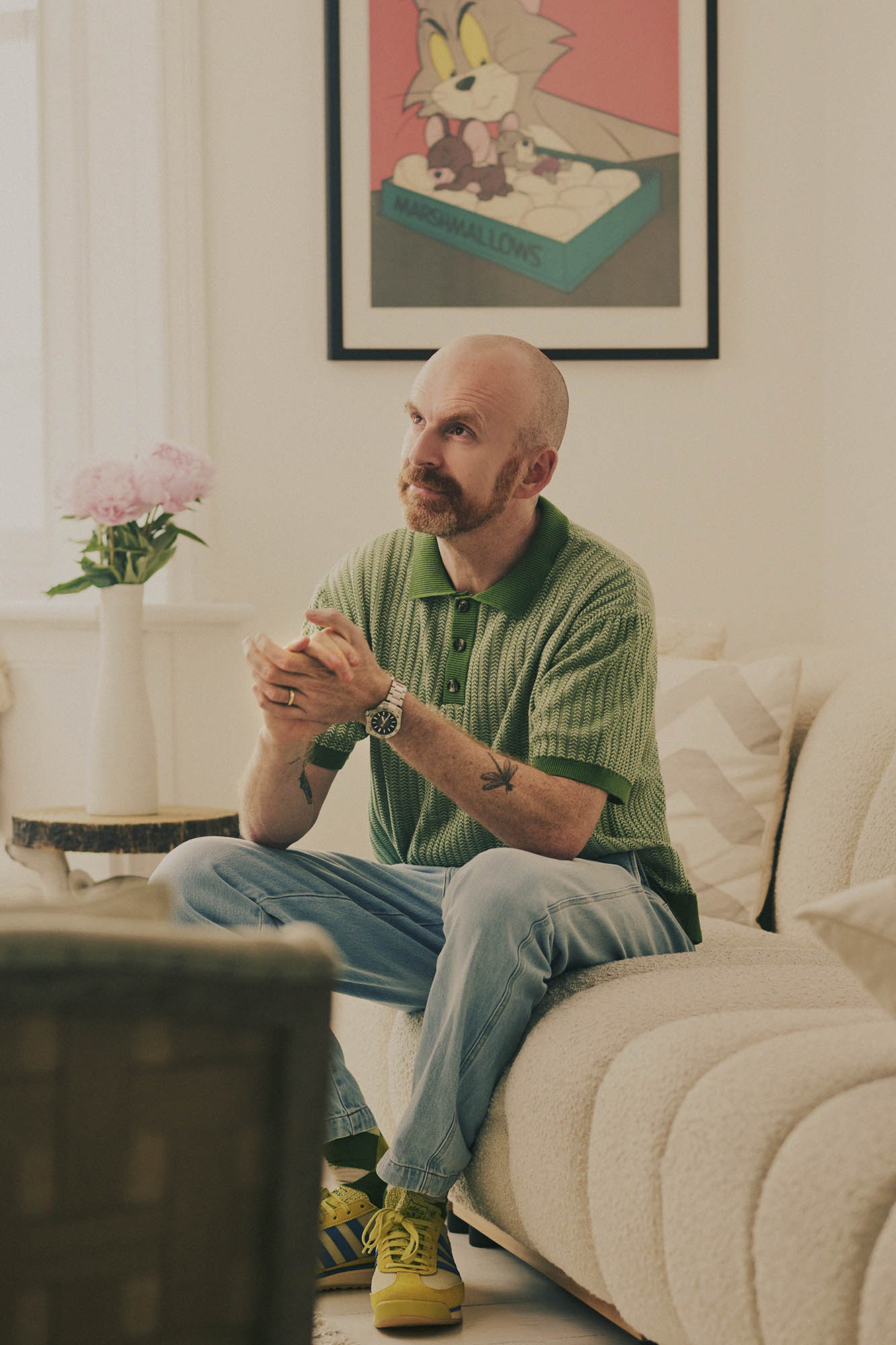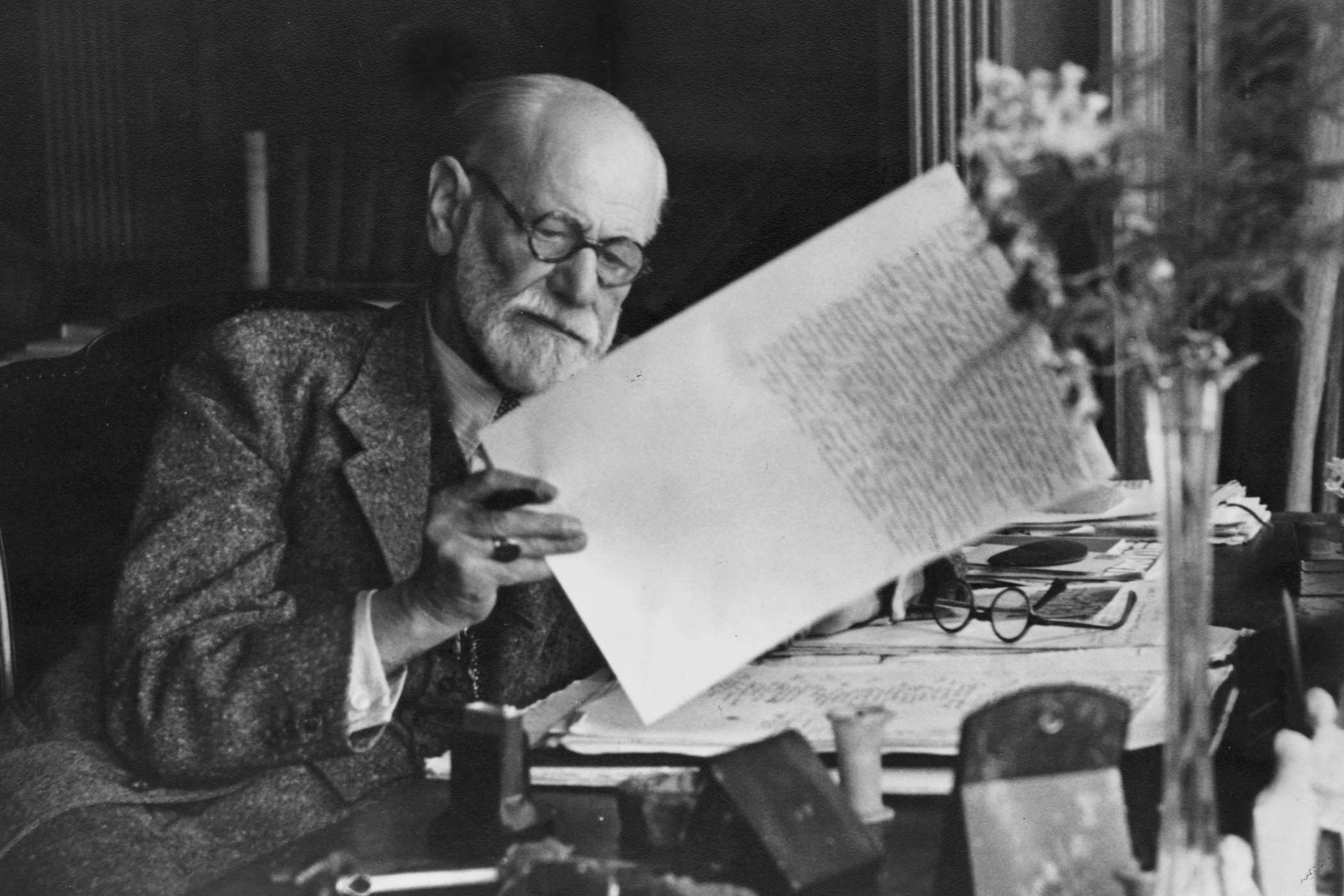Photography by Stewart Capper
As tends to happen when two men of a certain (middle) age get together, my meeting with Matt Haig begins with an extended preamble about back pain.
“Upper or lower back?” I ask.
“I’m an upper-back guy,” he replies, with a little wince.
“Chiropractor or osteopath?”
“Physio.”
We shuffle into the very white, very spotless living room of his home in Brighton, and Haig pulls out what looks like a black sock with two tennis balls in it. What’s that? “This is embarrassing to reveal in an interview, but it’s two tennis balls and a sock,” he confirms, jamming it between the chair and his thoracic spine.
The previous evening, Haig, a 49-year-old author, had gone with his teenage son to a Tyler, the Creator gig in London. “You’re already feeling like the oldest man in the world, because you are surrounded by 18-year-olds going crazy,” he says, “and then you’re trying to look like you’re dancing, but really you are just doing band twists.”
Still, Haig’s back troubles have had one significant upside: he’s spending much less time on social media, because the position aggravates his neck. “I used to be one of those people who’d have, like, six, seven, eight hours on their phone,” he says. “Now, it’s never over an hour, because it’ll give me pain. My body is literally saying: ‘Get off your phone!’”
Haig is one of Britain’s most prolific (24 books in 30 years!) and popular authors. His 2020 novel, The Midnight Library, about an unhappy woman who gets to glimpse alternate versions of her own life, has sold more than 9m copies. That book made Haig a global success, but he has been well-established in the UK since 2015, when his self-help memoir, Reasons to Stay Alive, detailing his long-running struggles with depression, rooted itself in the bestseller charts for almost a year.
Newsletters
Choose the newsletters you want to receive
View more
For information about how The Observer protects your data, read our Privacy Policy
The only thing that centres me, and that I feel any confidence and satisfaction in, is writing
The only thing that centres me, and that I feel any confidence and satisfaction in, is writing
Reasons to Stay Alive, which explained how, in 1999, a 24-year-old Haig found himself on a cliff in Ibiza determined to end his life, has its 10th anniversary this year. Others of his books have sold more and had better – certainly less polarising – reviews, but it is the one of which he is proudest. “It is very messy and imperfect,” Haig says. “And it’s a book that doesn’t really know what it wants to be, because it’s kind of self-help, but it’s not self-help coming from a doctor. It’s not self-help coming from a therapist. It’s just an experience that I went through.”
The book is also the one that Haig is most likely to be stopped in the street to talk about. “You’ll get the tears and stuff, because it reaches people at often their worst point,” he says. “It’s rare as a writer to feel useful – even if you are just slightly useful, not as useful as doctors.” He pauses. “But it’s definitely not a substitute for the proper help.”
Haig is keen to swerve the dangers of setting himself out as a modern-day guru. “People expect you to offer nonstop wisdom, like you’re the Dalai Lama,” he smiles. “And when you’re just a wanker living in Brighton, that becomes a bit discombobulating.”
Around the word-of-mouth surge of Reasons to Stay Alive, Haig began to become a public figure beyond his books. While many authors steer clear of social media, or gloat about the measures they take to avoid online distraction, he has long been highly visible on X and Instagram. “I had a little bit of a small, working-class town attitude about it, where you go out and you sell your stuff,” says Haig, who grew up in the Nottinghamshire town of Newark, and still has traces of the Midlands accent. “You sort of be your own market trader and you don’t have the shame in it. Whereas in the arts world generally, and publishing specifically, that makes you look quite brash. It was a polite code that I didn’t know. I didn’t quite understand.”
Haig is aware that his profile, and his readiness with hot takes, have rubbed some people up the wrong way. “When everyone was still on Twitter, I was tweeting sometimes 20 times a day, putting opinions out there,” he says. “It was an age where there were a lot of annoying people, and I was annoying myself. You know, when someone’s just in your face all the time.”
In recent times, though, Haig has been much less visible. Since The Midnight Library he has published just one novel, the paranormal thriller The Life Impossible, which came out last September. For a year, he pretty well left social media altogether. At various points during this hiatus, Haig wondered if he might be finished as an author. “I was very close to not writing anything ever again,” he says.
It was an age where there were a lot of annoying people, and I was annoying myself
It was an age where there were a lot of annoying people, and I was annoying myself
A lot was going on in Haig’s life during this period, which roughly coincided with the Covid pandemic. Family members were ill and required extra vigilance. The Midnight Library came out and – Haig knows this is a strange thing to complain about – sold unexpectedly and phenomenally well. “You are getting everything you’ve dreamed of, but then suddenly being faced with all the bad shit that comes with it,” says Haig. “Then you have this moment of, ‘I just wish I hadn’t written The Midnight Library.’ You want to push it all back, because it is all just building and building and building and building.”
Meanwhile, stuck at home, Haig noticed the telltale signs of depression, which were a near-constant companion in his 20s and 30s, returning. And it became clear that he had a drinking problem. “Every Saturday night, I’d hit the gin and have the best part of a bottle,” he says. “So Sunday, Monday, I’d be in a foul mood, and I was just hating myself.”
Haig, who today wears a T-shirt and jeans, his ginger hair shaved to the scalp, rolls the tennis balls around his spine and reflects, “Too many eyes on me.”
A year of therapy, which he’d never done before, helped Haig, but he credits the main transformation to giving up booze. He was also diagnosed with autism and ADHD at the age of 46, which helped explain some of his behaviours and his addiction to social media. “The big misconception about ADHD is that it’s just not having an attention span,” he says. “I do have an attention span. I can hyper-focus on getting books done, but the problem with the hyper-focusing is everything else you’re shit at. So you’ll be a crap husband, crap father, crap human being out in the world. You’re not being a mindful, careful citizen.”
But what could he do that wasn’t writing? For a year, Haig pursued the idea of, first, opening a bookshop, even sizing out premises, and then a sober bar, which is “very Brighton”, he notes, before accepting, “I was one of those annoying evangelical sober people.” But neither of the plans stuck and Haig slowly drifted back to working on book ideas. “The only thing that centres me, and that I feel any confidence and satisfaction in,” he says, “is writing.”
Haig is very much in the flow of it again now. The Life Impossible, now out in paperback, has not sold as well as The Midnight Library, but made him rediscover his love for the process.
“I don’t like to say, ‘This is my best novel,’ but The Life Impossible was definitely the most enjoyable and empowering experience I’ve had writing... possibly ever, but certainly since my first or second book,” he says. “It was like I was discovering myself as a writer again. What I mean by that is, a few years before I probably wouldn’t have dared write anything openly science-fiction, because I know that 50% of my readers would be turned off by that.”
It was like I was discovering myself as a writer again
It was like I was discovering myself as a writer again
Although Haig is not sure he will ever write again at the same furious pace that he did earlier in his career, he has just finished another book. So far only his partner – the writer Andrea Semple, with whom he has two teenage children – and his agent have read it.
“Right now, I’m feeling neurotic,” Haig admits. “It’s definitely not a sequel to The Midnight Library, but because it’s a book about the afterlife, it’s now got references to it.” Haig catches himself, perhaps wanting to manage expectations, and repeats: “But it’s not a sequel.”
And before that, in July, Haig has his 50th birthday to celebrate. When he stood on the edge of that cliff in Ibiza back in 1999 he didn’t expect to make it to the age of 25: “The future was a hypothetical concept,” he writes in the new introduction to Reasons to Stay Alive. So, reaching his half-century is something of an unexpected milestone.
To mark the occasion he’s planning to return to Ibiza with Semple and her family, and maybe go clubbing. “But definitely no alcohol,” he clarifies, as he shows me to the door. “You can do daytime clubbing, keep the biological rhythms going. And look like I’m still young again.” That dodgy back permitting, of course.
The Life Impossible by Matt Haig is published by Canongate at £9.99



